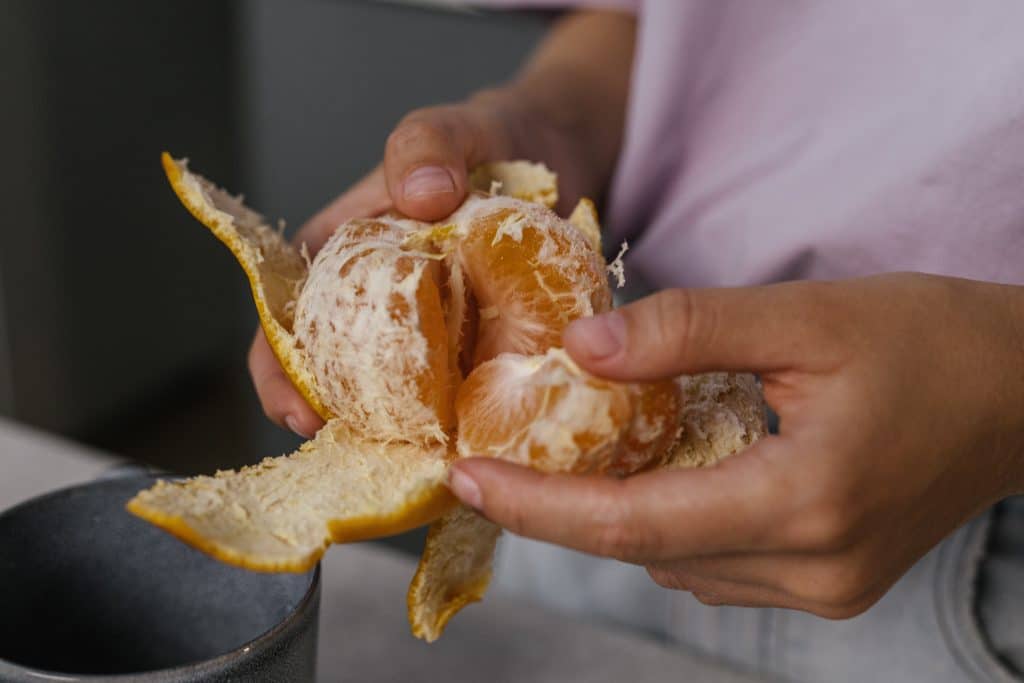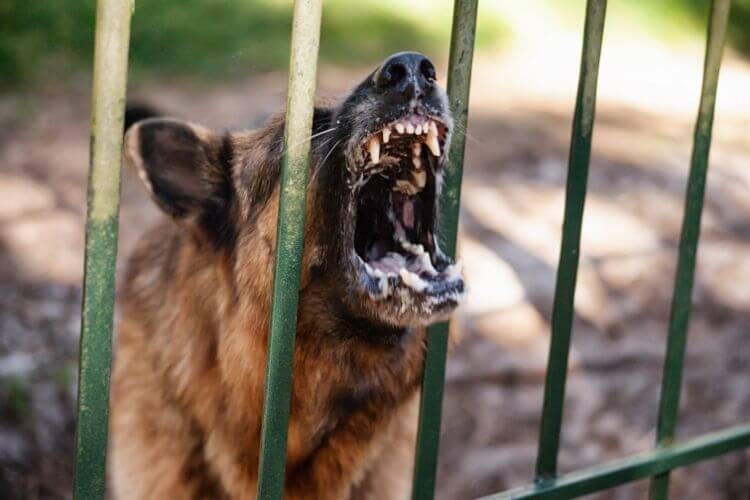Imagine eating an orange, and your dogs come near, looking at you as if to say, “May I please have some?” What would you do? Can dogs eat oranges anyway?
Your dog can eat any type of orange, including mandarin, blood oranges, and bergamot oranges. Though every type of orange is safe for the dog, the seedless navel is preferred. In addition, only the citrusy flesh is safe for your dog to eat. Orange peels and the plant material cause serious health issues in dogs.
Oranges are only treats and should never exceed 10% of the recommended dog’s daily calorie intake. That’s approximately 1 to 2 orange pieces for large dogs daily. Dogs cannot eat oranges in large quantities because of the large amounts of sugar and dietary fiber content.
In this article, I will take you through the nutritional value of oranges, the benefits and risks of feeding your dog oranges, and more.
Let’s get started.
Can Dogs Eat Oranges?
Yes, dogs can eat oranges. According to the senior Director at ASPCA Animal Poison Control Center, Tina Wismer, dogs should only eat citrusy flesh.
As with the pineapple skin, dogs should not eat orange skin (peels) and the plant material as they’re toxic.

Other nutrients found in oranges include potassium, antioxidants, dietary fiber, thiamine, iron, and folate.
Briefly, let's take a closer look at these nutrients to know the health benefits of oranges for your dog.
Vitamin C
It’s the vitamin C in the orange fruit that keeps your dog’s immune system strong. Due to the presence of vitamin C in the dog’s body, it’s pretty easy for his body to absorb iron and produce collagen.
Also, according to Lucia Garcia's comments on Quora, your dog absorbs phosphorus and calcium effectively when he gets enough vitamin C.
Dietary Fiber
Without dietary fiber, your pup could have trouble digesting food effectively. In addition, the dietary fiber in the citrus fruit is essential for maintaining regular bowel movements in dogs. So, when your pup eats an orange, his gut health will be superb!
Potassium
Your dog’s heart and kidneys need potassium. Potassium helps the dog’s heart and kidneys to function correctly. In addition, potassium aids your pup's body to regulate body fluids.
Manganese
One of the reasons why your husky and other dogs should eat strawberries and oranges is to strengthen their bones. These fruits are rich in manganese, a nutrient that gives dogs strong and healthy bones.
Add manganese to his diet to have healthy cartilage in your dog’s joints. Also, to boost the energy levels in your dog’s body, his body needs to metabolize protein and carbohydrates successfully.
So, since your dog's only source of manganese is fruits, vegetables, eggs, whole grains, and legumes such as peas, you should consider giving him oranges.
How Much Orange Can a Dog Eat?
It’s OK for your dog to eat oranges if you stick to the recommended quantity. The size of your dog determines how much is enough for him in a day. For example, the Newfoundlands can eat at least two slices of an orange daily without complications.
On the other hand, extra small breeds might need only ½ of an orange segment daily. According to Lucia, a small portion of an orange could help significantly meet your dog’s daily vitamin C requirements.

Below is a table to guide you on the right size of an orange to give your dog.
| Size | Weight | Size ( peeled orange segment) |
| Extra-large dog | 91 lbs. and above | 2 |
| Large dog | 51 to 90 lbs. | 1 to 2 |
| Medium dog | 31 to 50 lbs. | 1 |
| Small dog | 21 to 30 lbs. | ½ |
| Extra-small dog | 2 to 20 lbs. | ½ |
Can Oranges Be Deadly for Dogs?
Though oranges benefit dogs greatly, especially by guarding their immune system, they can have deadly impacts on them, too.
Too Much Sugar and Fiber Are Toxic
When given in large sizes to dogs, oranges could become toxic to your dog because they have high amounts of sugar. As with pineapples, too much sugar could cause constipation and diarrhea. Hence, to have a healthy pet, consider portion control always.
The dietary fiber in oranges could be hard to digest in large quantities. This could cause digestive issues such as diarrhea, gallstones, and gas.
Choking Hazards
The seeds in oranges could become a choking hazard, especially for small breeds. Therefore, removing the seeds before giving your dog the orange is wise.
Alternatively, consider feeding your dog the seedless orange varieties, for example, clementines and the Navel.
Underlying Health Problems
Every dog is different. For pet owners with overweight dogs or ones with an underlying health problem such as diabetes, you better not feed them oranges.
According to DVM and a partner in New York, Brooklyn Cares Veterinary Hospital called Stephanie Liff, “Oranges can affect blood values in diabetic dogs, more due to the vitamin C than the sugar levels, and would be best avoided in these patients.”
For obese pups, consider buying dry dog food to help them lose unhealthy weight.
After all, obesity is one of the dog killers in the world.
Tooth Enamel Decay
Though, according to Lucia, the organic acid such as citric and succinic acids in oranges act as appetizers for dogs and strengthens the digestive system, these acids could also cause vomiting and diarrhea.
The acid is also unfriendly to your dog’s teeth enamel. So, unless your dog’s saliva cleanses his enamel after eating the citrus fruit, he could lose his teeth after a couple of days.
Just like guinea pigs need water, so do dogs, not just for quenching but for cleansing their tooth enamel after eating oranges. Water will wash away any acidic juice that saliva left out.
Therefore, starting with a small portion and waiting to see if there are any adverse reactions is always safer. Also, your dog could have an underlying problem and not show any signs. So, please talk to your vet before ‘treating’ your pet with an orange.
And, of course, stick to the recommended total serving per day quantity.
Orange Peels and Leaves
As mentioned previously, the orange peel isn’t safe, nor is the rest of the orange plant. Therefore, peel the oranges before feeding the dog, as they could have a GI upset.
Besides, like the orange seeds, the peels also cause Gastrointestinal (GI) issues in most dogs. So, it’s necessary to stay away from them.
What Should I Do if My Dog Drinks Orange Juice?
While the peeled and seeded orange fruit is safe for your dog, orange juice could be dangerous based on how much he takes. So, if your dog takes the juice, don’t panic if he has only taken a small amount, like sipping once or twice.
The juice has too much sugar; hence, he may have an upset stomach if he takes too much of it. The ‘good’ citric acid could also become toxic to him when consumed in large quantities.
So, if he takes a whole mug of the juice, it should be a cause for alarm. Please make sure you have contacted your vet immediately.
If you want to hydrate your dog on a hot summer day, please give him unsweetened water. That will work well for him.
Better still, take the juice and only give ½ an orange slice for extra-small dog breeds. For extra-large dog breeds, 2 orange slices are enough.
Given the recommended amount, oranges are great dog treats, but you must prioritize the pet's health. In case of an underlying health problem such as diabetes or gastrointestinal issues, don’t have oranges in your dog’s diet.
FAQs
Why Do Dogs Not Like Oranges?
No! Dogs like oranges because of their fruity, sweet, and moderately tangy flavors. Hence, they can eat as many oranges as possible. That’s why you should only have enough (as recommended) at his disposal.
What Fruit Can't Dogs Eat?
Though dogs can eat most human foods, some could be toxic. Examples of fruits you should not feed your dog include grapes and avocados. These two fruits have toxins that could adversely affect your dog’s health.
If your dog feeds on them, please contact his doctor immediately.

Healthy pups benefit from oranges because they’re rich in vitamin C, iron, potassium, magnesium, and potassium, among others.
However, there’s another side to this delicious dog treat: It has seeds and high sugar content, like the watermelons do. While the seeds could choke your pup, sugar could cause him to have diarrhea or constipation problems.
Besides, Citric acid could adversely affect the tooth enamel of your dog if he doesn’t drink water after that to rinse it.
Don’t forget your dog is never to eat the orange peels or leaves. It’s the citrusy part he needs; it will benefit him health-wise.
To be safe, it is always a good idea to book an appointment with your vet and assess your dog to ascertain if it is safe for him to eat oranges and in what servings.


